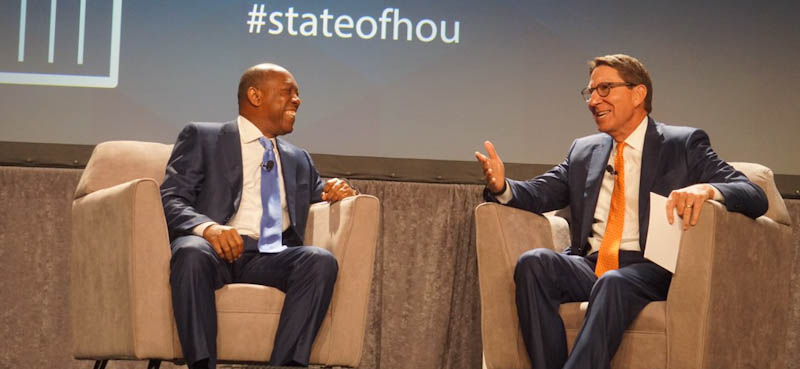Mayor Turner Talks Resiliency, Parks and Innovation at '19 State of the City
Published May 21, 2019 by A.J. Mistretta
Mayor Sylvester Turner reviewed Houston’s progress over the last year in areas such as innovation and resiliency and laid out additional priorities during the annual State of the City address on May 20. Turner discussed improvements he wants to see in education, transit and green space before a group of 1,600 attendees at the event hosted by the Greater Houston Partnership.
“The state of our city is strong, resilient and sustainable and the best is yet to come, he said.
After giving his prepared remarks, Turner participated in a one-on-one discussion with H-E-B President Scott McClelland, who is serving as the 2019 Chair of the Partnership. Click here to see the full event. Here are a few of the highlights from the event.
On Infrastructure
Infrastructure remains a top priority for the administration. Under the city’s Build Houston Forward initiative, there is now a greater focus on drainage and infrastructure improvements in neighborhoods and not just in major centers of activity and thoroughfares. There are currently 239 such infrastructure projects in the works. “We are moving in the right direction,” he said, “but we need to do more projects sooner.” On another infrastructure-related front, Turner said the Houston Ship Channel needs to be widened and deepened if the Port of Houston is to remain the economic engine its become.
On Resiliency
With the 2019 hurricane season less than two weeks away, post-Hurricane Harvey resiliency was a major discussion point. Turner said his office will continue to work with the Partnership and Houston’s elected officials in Washington to secure the $4 billion in federal funds appropriated after Harvey that have yet to be released. He said projects ranging from an additional reservoir to the long-discussed “coastal spine” are needed to adequately protect the region.
On Parks and Green Space
Turner said that while many of the city’s signature parks such as Discovery Green and Hermann Park have become extraordinary assets, too many of the parks within neighborhoods do not see the same type of investment and use. The Mayor rallied the business community to support Houston’s park infrastructure through an initiative dubbed “50-for-50” where he is asking the Partnership, the Houston Parks Board, and the Parks Department to bring together 50 companies to form a city-wide coalition for neighborhood parks, primarily in communities that have been underserved. “You can’t create complete communities unless you create green space,” he said. “All Houstonians should have access to great parks and this will touch every district in the city.” A special thanks to H-E-B which has agreed to be the first company to get on board. To join this initiative and ensure your organization is part of the 50-for-50 effort, email 50for50@houston.org
On Transportation
Growing traffic congestion often tops the list of concerns among Houston residents. Mayor Turner said Houston must work to increase the options available to Houstonians if the city is going to continue to compete with its counterparts. He encouraged the audience to educate themselves on the elements included in the MetroNEXT plan that will go before voters on the November ballot. That plan will help carry the transit agency forward with increased multi-modal options, from bus rapid transit (BRT) to light rail. “We must give people transportation options that meet their needs,” he said. “We need to be bold and transformational.”
On Proposition B
Turner said that with last week’s decision by Harris County Civil Judge Tanya Garrison ruling Proposition B unconstitutional, the city has rescinded layoff notices to hundreds of municipal employees and firefighters. The Mayor said the decision puts the city’s financial outlook on much better footing and he remains willing to sit down with the Houston firefighter’s union to reach a deal on a pay raise. “Our firefighters are deserving a raise that the city can afford,” he said.
On Technology and Innovation
Turner said when it comes to technology and innovation, Houston has worked overtime to catch up to where it needs to be. Now, the city’s ecosystem is poised for success thanks to the combined efforts of a number of organizations working together. The Mayor pointed to the creation of Houston Exponential and its fund of funds, which has raised more than $25 million so far, as well as a multitude of local startups being aided by new groups like The Cannon, Station Houston and MassChallenge. Meanwhile, Rice University’s plan to transform a former department store building into an innovation hub called The Ion is expected to jumpstart a planned innovation district in Midtown.
On Education
Houston should be proud to be the energy capital, an emerging hub for tech and innovation and the location of the largest medical center in the world. But the city’s economic success doesn’t mean much if its young people lack the education to find opportunity, the Mayor said. “We owe it to our kids to provide them with a quality education, we know what it can mean,” he said, adding that several of our schools and school districts are not operating at their best. “If our kids are not succeeding, it’s not because they’re not capable or not smart, it’s because adults have failed them, and failure is not an option in Houston.” Turner said education improvement must be addressed in a holistic and transformational way.
Learn about other major Partnership events coming up and explore the Public Policy section for additional insight into the organization's work at the municipal, state and federal level.
 The Houston Report
The Houston Report



















